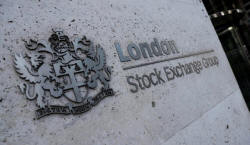Emerging markets and equities reel as dollar flexes
muscles
 Send a link to a friend
Send a link to a friend
 [September 05, 2018]
By Sujata Rao [September 05, 2018]
By Sujata Rao
LONDON (Reuters) - The sell-off in emerging
markets gathered pace on Wednesday and global stocks fell for the fourth
day in a row as a looming deadline in the U.S.-China trade conflict kept
the dollar holding firm near two-week highs.
Wall Street was set to open weaker.
A public comment period on the possibility of fresh U.S. tariffs on
another $200 billion of Chinese goods ends on Thursday, with
expectations that the additional levies will be imposed by U.S.
President Donald Trump.
The United States and Canada will also resume discussions on Wednesday
on revamping the North American Free Trade Agreement (NAFTA). Ottawa is
not expected to back down on key issues despite Trump's threats to
retaliate.
The dollar is benefiting from these uncertainties. But it has also drawn
strength from upbeat U.S. indicators supporting the case for further
interest rate hikes by the Federal Reserve -- data showed U.S.
manufacturing activity accelerating to more than a 14-year high in
August.

Measured against a basket of currencies, the dollar was flat on the day,
though it retreated a touch to stand just off two-week highs hit on
Tuesday.
The greenback's 8 percent surge since end-March has sent emerging
markets reeling, with MSCI's emerging equity benchmark falling for the
sixth day in a row and down 1.5 percent on the day, while an index of
emerging market currencies shed 0.3 percent to 15-month lows.
European shares retreated 0.6 percent to two-month lows, following weak
closes in Asia, where expectations of U.S. tariffs sent Chinese shares
down almost 1 percent.
"Until last month people were focusing on U.S. company earnings but now
they are looking closely at what's happening in emerging markets, at the
trade war and the fact that the United States is likely to implement
another wave of tariffs against China," said Christoph Barraud, an
economist at Paris-based brokerage Market Securities.
"If you look at global growth, more and more signs are that it will slow
in coming months."
The growth outlook fears, particularly for the developing world, were
encapsulated by South Africa where data on Tuesday showed the economy
slipping into recession for the first time since 2009. The rand has
subsequently joined the Turkish lira and Argentine peso in a relentless
sell-off, falling 1 percent and adding to the previous day's 3 percent
slump.
Argentina's peso fell again on Tuesday, even though International
Monetary Fund chief Christine Lagarde confirmed the IMF was working to
improve a $50 billion standby finance deal for the country. The peso has
shed more than half its value to the dollar this year, with Turkish lira
a close second, having fallen more than 40 percent.
[to top of second column] |

Signage is seen outside the entrance of the London Stock Exchange in
London, Britain. Aug 23, 2018. REUTERS/Peter Nicholls/File Photo

There were signs of distress also in Indonesia, where the rupiah is trading at
its lowest since the 1998 financial crisis. The Mexican peso shed 1 percent to a
two-month low against the greenback.
"Rising U.S. rates, weak emerging market macro fundamentals and jittery
geopolitics make for a poisonous concoction for EM assets," analysts at Danske
Bank said.
They also highlighted a geopolitical element to the sell-off, noting that Russia
and Turkey at least had "seen their crises aggravated by geopolitical
confrontation with the U.S.".
The trade war fears are not sparing U.S. markets either, with equity futures for
all three New York indexes down around 0.3 percent.
Along with the U.S. interest rate outlook, these concerns are keeping intact the
dollar's safe-haven appeal. The greenback was at a near one-week high versus the
yen while the euro was flat, following a loss of 0.35 percent on Tuesday.
The British pound retreated 0.2 percent to two-week lows.
"In a context where U.S. growth is still resilient, it supports a Fed rate hike
in September and likely also in December," Barraud said. "There is focus on the
growth differential (between the United States and the rest of the world)."
One bright spot was Italy, where the mood has been lifted by signs the coalition
government has abandoned plans for a spending binge that would have risked
credit rating downgrades and put Rome on collision course with the European
Union.
Italian stocks rose 1 percent, contrasting with declines elsewhere and sovereign
borrowing costs fell sharply -- 10-year bond yields slipped under 3 percent for
the first time in more than two weeks.

On commodity markets, oil prices fell one percent, pressured by the dollar and
signs a tropical storm had impacted U.S. Gulf coast production less than
expected.
(Reporting by Sujata Rao; Additional reporting by Shinichi Saoshiro in Tokyo;
Editing by Catherine Evans)
[© 2018 Thomson Reuters. All rights
reserved.] Copyright 2018 Reuters. All rights reserved. This material may not be published,
broadcast, rewritten or redistributed.
Thompson Reuters is solely responsible for this content. |